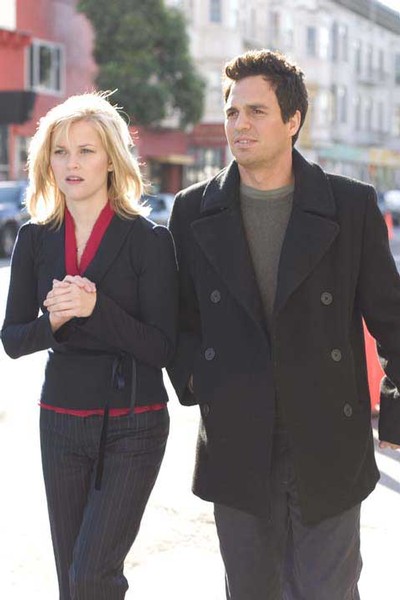
Reese Witherspoon plays Elizabeth Masterson, a young doctor who finds herself in a coma after a car accident. Her spirit stays alive in her old apartment where David (Mark Ruffalo) now lives.
Just Like Heaven was undoubtedly “brainstormed,” and I mean that in the most sterile way possible. (Agent: [drinks from glass of water] “OK, Bob, let’s brainstorm here. Next movie, next movie, hmmm.”)
It’s the product of a situation that plays out something like this: a pitch session in which a studio executive remembers how much he loved Ghost when he was working in the mailroom at the William Morris Agency in the early ’90s. He spins back and forth in his leather chair, taps a pen on his rosewood desk, turns to a writer and queries, “What if we do something like, um, like Ghost, but not, like different sort of, you know, with a twist, maybe?” He hunches forward and pounds the desk, “Wait, wait! We can get Napoleon Dynamite in this too! Napoleon f—-ing Dynamite!”
And, BAM! Two years later, reels of film – the culmination of millions of dollars, thousands of man-hours and star power – spin on a projector at a theater near you for two mediocre, nominally entertaining hours.
That’s Just Like Heaven in a nutshell.
It’s like Ghost, both structurally and emotionally, but cheerier and more cuddly, despite the death, despite Reese Witherspoon on life support and despite Mark Ruffalo as a drunk widower named David Abbott, who used to own a successful landscaping company, but quit after his lady died from a brain hemorrhage.
And then there’s Jon Heder, otherwise known as Napoleon Dynamite, whom I refuse to acknowledge as anyone else. He comes in later.
Witherspoon plays Elizabeth Masterson, a young doctor who’s not above spending 23-hour shifts in the emergency room, fending off marriage proposals from old men/patients and restraining hallucinating, punk-rocking drug addicts. She’s a committed idealist without an outside life, and on her way home from work one night, she’s hit by a truck.
She clutches the steering wheel in horror, closes her eyes and the screen goes white. In Ghost, of course, this is where Patrick Swayze gets murdered.
And it only gets more Ghosty from then on. David moves into Elizabeth’s apartment. She’s not dead, really. Her spirit is still alive, living in her old apartment, and he finds out she’s actually in a coma, laying in a hospital on life support in the San Francisco hospital where she works. Then, Elizabeth’s sister has to decide, after three months of waiting, whether or not it’s time to cut her off.
And in a true Whoopiesque twist (God, I love Ghost – Whoopi is fantastic, isn’t she: “Molly, you in danger, girl.”), it becomes Ruffalo’s job to convince Witherspoon’s sister that she’s still alive, and that she doesn’t want to be taken off life support. Meanwhile, Ruffalo and Witherspoon, who have been battling wits for several days in the apartment, begin to fall in love.
Meanwhile, Napoleon Dynamite (Heder) plays a metaphysical bookstore owner who helps Ruffalo and Witherspoon navigate the middleworld Witherspoon is stuck in, all the while maintaining that same squinty-eyed, gap-toothed gaze we all love.
It is what it is, I suppose – a classic Hollywood rip-off job. Witherspoon, who is eternally endearing, makes artificial life support seem like a hoot, which actually made me chuckle when I was walking out of the theater. Ruffalo is good here too. The problem with Just Like Heaven isn’t the performances. It’s the script itself. We’ve seen this all before, and at some point, this sort of thing isn’t going to work anymore.
Hollywood better get ready for when that day comes.
Contact reporter Jonathan Cribbs at cribbsdbk@gmail.com



